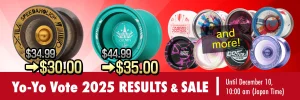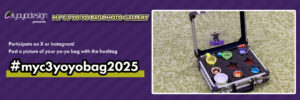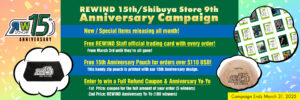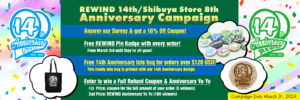So you’re on your way to the World Yo-Yo Contest in Tokyo, Japan. It’s never too late to try learning a few phrases in the local language! We’ve compiled a list of some of the things you might want to be able to say when talking with your new friends in Japan, as well as some useful phrases to get you through your time in the land of the rising sun.
How to read this guide:
English Phrase
Japanese Phrase in Japanese text (Japanese Phrase in roman letters)
Ex. Good morning!
おはよう(ございます)! (O-hayo [goza-i-masu]!) <—[the letters are hyphenated and spaced to help you pronounce them more easily]
Ex. May I have your autograph?
サインをください。(SIGN o kuda-sai.) <—[the word in ALL CAPS is an English word and you should pronounce it the same as in English]
Basic/survival phrases:
Hello.
こんにちは。 (Kon-nichi-wa.)
__ please (give me / to use when you’re ordering in a restaurant).
○○を下さい。 (__[the thing you want/to order] o kuda-sai.)
Thank you (very much).
ありがとう(ございます)。 (Ari-gato [goza-i-masu].) <—[Just “Ari-gato” is fine, but if you want to be extra polite, add the “goza-i-masu” at the end. :)]
Excuse me.
すみません。 (Sumi-masen.)
(I’m) sorry.
ごめんなさい。(Gomen-nasai.)
How much is it?
いくらですか? (Iku-ra desu ka?)
Where is the bathroom/toilet?
トイレは何処ですか? (To-i-re wa doko desu ka?)
Can you speak English?
英語を話せますか? (ENGLISH o hana-se masu ka?)
I can’t speak Japanese.
日本語できません。 (Ni-hon-go deki-masen.)
See you later!
またね! (Mata ne!)
[A phrase said when you begin eating–something like “I humbly take this food.”]
いただきます!(Ita-daki masu!)
Thank you for the food. [Said at the end of the meal.]
ごちそうさまでした。 (Gochi-so-sama deshita.)
Cheers!
かんぱい! (Kan-pai!)
Self-Introduction:
Nice to meet you.
はじめまして。(Haji-me mash-ite.)
My name is __.
私の名前は○○です。(Wa-tashi no nama-e wa __ desu.)
Long time no see!
久しぶり!(Hisa-shi-buri!)
How are you doing?
調子はどうですか?(Cho-shi wa dou?)
I’m a big fan of yours!
私はあなたの大ファンです!(Wa-tashi wa anata no dai FAN desu!)
I like your (__) freestyle / trick / style.
私はあなたの (__の) フリースタイル/トリック/プレイスタイル が好きです。
(Wa-tashi wa anata no [__ no] FREESTYLE/TRICK/STYLE ga suki desu.)
[ex. 2014 World Yo-Yo Contest Finals]
When you want to cheer for someone:
I’m looking forward to your freestyle!
あなたのフリースタイルを楽しみにしています!(Anata no FREESTYLE wo tano-shimi ni shi-te-i-masu.)
Good luck!
がんばって!(Gan-bat-te!)
To ask for a picture or autograph:
May I take a picture with you?
一緒に写真をとってもくれますか?(Issho-ni sha-shin o totte kure-masu ka?)
May I have your autograph?
サインをください。(SIGN o kuda-sai)
May I take a video?
動画をとってもいいですか?(Douga wo totte-mo ii desu ka?)
May I post this online?
SNSにアップロードしてもいいですか?(SNS ni UPLOAD shi-temo ii desu ka?)
Some questions you may want to ask:
What (yo-yo/string/pad) are you using?
なんの(ヨーヨー/パッド/ストリング)を使っていますか?(Nan no [YO-YO/STRING/PAD] o tsu-katte-masu ka?)
Can you teach me that trick?
そのトリックを教えて下さい。(Sono TRICK wo oshi-e-te kuda-sai.)
What music did you use for your freestyle?
あなたのフリースタイルで使用した曲は何ですか?(Anata no FREESTYLE de tsu-katta MUSIC wa nan desu ka?)
-I used __.
– 私は__を使いました。(Wa-tashi wa __ o tsu-ka-i-mash-i-ta.)
Do you have a (Facebook / Instagram / Twitter / etc.) account?
(Facebook/Instagram/Twitter) のアカウントを持っていますか?([FACEBOOK/INSTAGRAM/TWITTER/etc.] no ACCOUNT wo motte-i-masu ka?)
-Yes, I do. My ID is __. – はい、持っています。___です。(Motte-masu. ID wa __ desu.)
-No, I don’t. But, I have a __ account. – いいえ、持っていません。しかし__のアカウントならあります。(Motte-masen. Shi-kashi __ no ACCOUNT wo motte-i-masu.)
How do you practice?
普段どのように練習していますか?(Fudan wa dou-yatte ren-shu shi-te-masu ka?)
Can you tell me how to get to __(official hotel, Belle Salle [the contest venue])?
(オフシャルホテル / ベルサール) にはどうやって行けばいいですか?([OFFICIAL HOTEL/BELLE SALLE] ni wa dou-yatte ike-ba ii desu ka?)
Regular conversation:
Do you want to go to (lunch / dinner / bar / karaoke / etc.) with me?
一緒に (お昼/晩御飯/バー/カラオケなど)にいきませんか?(Issho-ni LUNCH/DINNER/BAR/kara-oke/etc. ni iki-masen ka?)
-Sure! – いいですよ!(Ii desu yo/OK.)
-Sorry, I have other plans. – ごめんなさい、別の用事があります。(Gomen-nasai, hoka no yaku-soku ga ari-masu.)
What do you want to eat?
何か食べたいものはありますか?(Nani-ka tabe-tai-mono wa ari-masu ka?)
What do you recommend?
おすすめのものはある?(O-susu-me wa aru?)
Do you want to try (SUSHI/YAKINIKU/UDON etc)?
(寿司 / 焼き肉 / うどん) を食べてみる?(SUSHI/YAKINIKU/UDON o tabete miru?)
-Yes. -はい。 (Hai!)
-No, I can’t eat __. – すみません、__は食べられません。(Sumi-masen, __ wa tabe-rare-masen.)
-I have __ allergy. – __アレルギーがあります。(__ are-ru-gi ga ari-masu.)
Where is your hotel?
ホテルはどこですか?(HOTEL wa doko desu ka?)
-I’m staying at __ Hotel. It’s in __. It is near __. 私は__ホテルに宿泊しています。__にあって、__に近いです。(__ HOTEL ni to-mat-te i-masu. __ ni atte, __ni chi-kai desu.)
-What about you? – あなたは?(Anata wa?)
When do you leave Tokyo?
いつ東京を離れますか?(Itsu Tokyo wo hana-re-masu ka?)
– I will leave __ (tonight, Monday night, tomorrow, in one week). – (今夜・月曜日の夜・明日・一週間以内に)離れます。([Kon-ya/ge-tsu yo-bi no yoru/a-shi-ta/i-shu-kan i-nai ni] hana-re-masu.) <—[It’s hard to account for all of the possibilities you could finish this sentence with, so it may be better to answer in English.]
How long are you staying in Tokyo?
いつまで東京にいますか?(Itsu ma-de Tokyo ni ima-su ka?)
What do you do?
普段何の仕事をしていますか?(Nan no shi-goto o shi-te-i-masu ka?)
-I work at __. – 私は__で働いています。(Wa-tashi wa __ de hata-rai-tei-masu.)
-I’m a student. – 学生です。(Gaku-sei desu.)
What do you do when you’re not playing yo-yo?
ヨーヨー以外の趣味は?(YO-YO i-gai no shu-mi wa?)
-I like to __. – __が好きです。(__ ga suki desu.)
What are your plans for the future?
将来何になりたいですか?(Sho-rai nani ni nari-tai desu ka?)
-I want to be a __. – 私は__になりたいです。(__ ni nari-tai desu.)
How was __?
__はどうでした?(__ wa dou deshita?)
At the contest venue:
What did you get (buy)?
何を買ったの?(Nani o katta no?)
-I got __. – __を買いました(手に入れました)。(__ o ka-i-mash-i-ta.)
Is this seat free? Can I sit here?
この席は空いてますか?(Kono seki wa a-i-te masu ka?)
-Yes. はい。 (Hai.)
-No, sorry, my friend is sitting here. – いいえ、すみませんが私の友人の席です。(Iie, sumi-masen ga, tomo-dachi no seki desu.)
Do you want to sit here?
ここに座りますか?(Koko ni su-wari masu ka?)
Do you want to sit with me (us)?
一緒に座りますか?(Issho ni su-wari masu ka?)
At the sales booths:
Do you have any different colors?
違うカラーはありますか?(Chi-ga-u COLOR wa ari-masu ka?)
Do you have a sample I can try?
使ってもいいサンプルはありますか?(Tsu-katte-mo ii SAMPLE wa ari-masu ka?)
Can I try this?
これを使ってもいいですか?(Kore o tsu-katte-mo ii desu ka?)
Do you have a sample of this yo-yo?
このヨーヨーのサンプルはありますか?(Kono YO-YO no SAMPLE wa ari-masu ka?)
How much is this?
これはいくらですか?(Kore wa iku-ra desu ka?)
What do you recommend?
おすすめはどれですか?(O-susu-me wa do-re desu ka?)
Which do you like better __ or __ ?
_と_どちらがいいですか?(__ to __ wa do-chi-ra ga ii desu ka?)
So how was it? We know it’s a lot to take in so don’t worry about remembering everything. Why not print this out and use it as a guide while you’re here, or save it on a smartphone or tablet to reference later? Even if you don’t feel confident speaking, just know that most Japanese people will be so happy just to see that you are trying. We’re sure they’ve been practicing their English too, so you can look forward to some fun conversations. Now get out there and make some new friends! See you in Tokyo!!!








